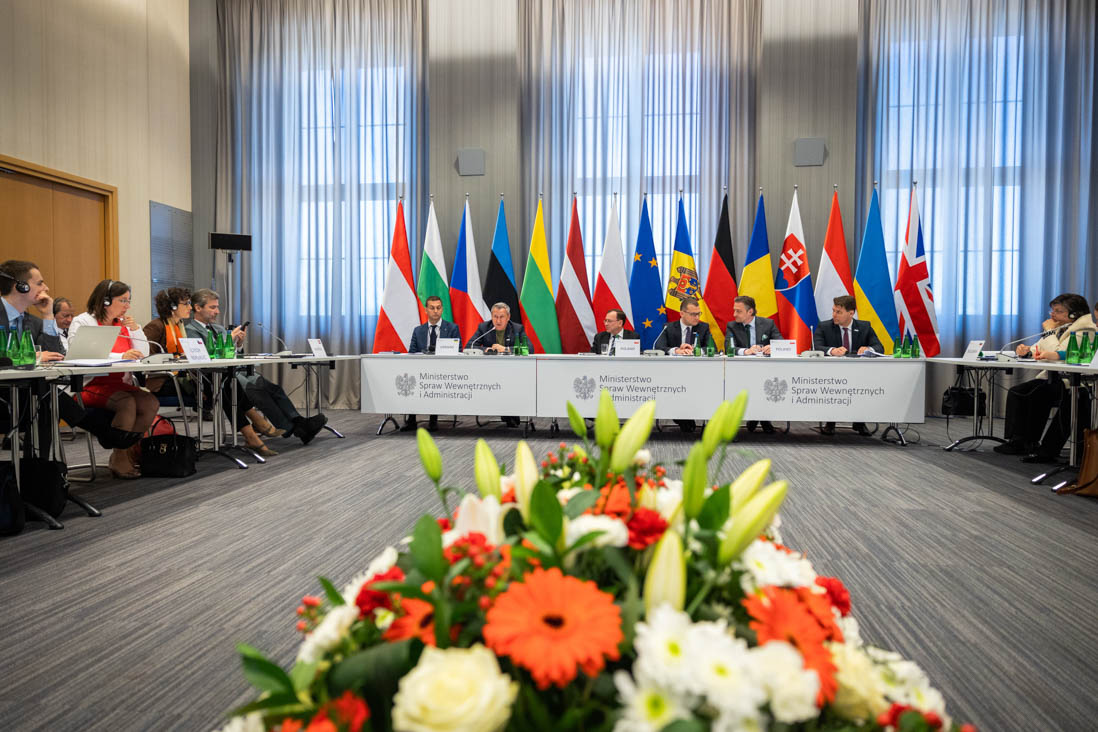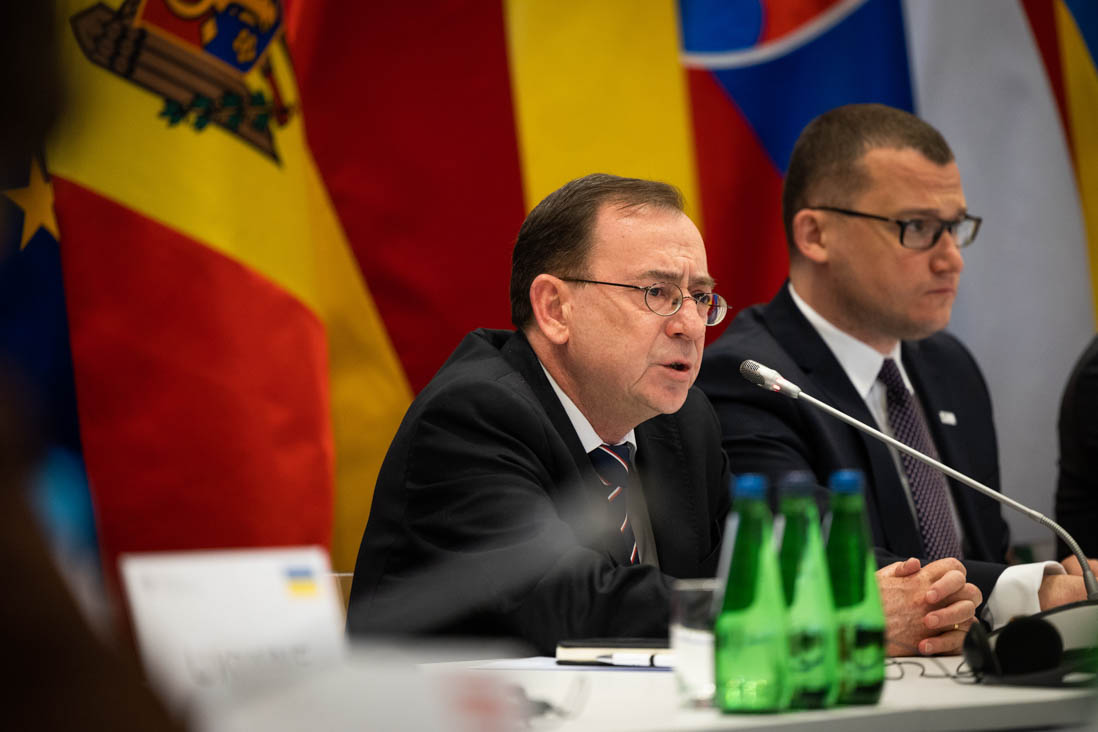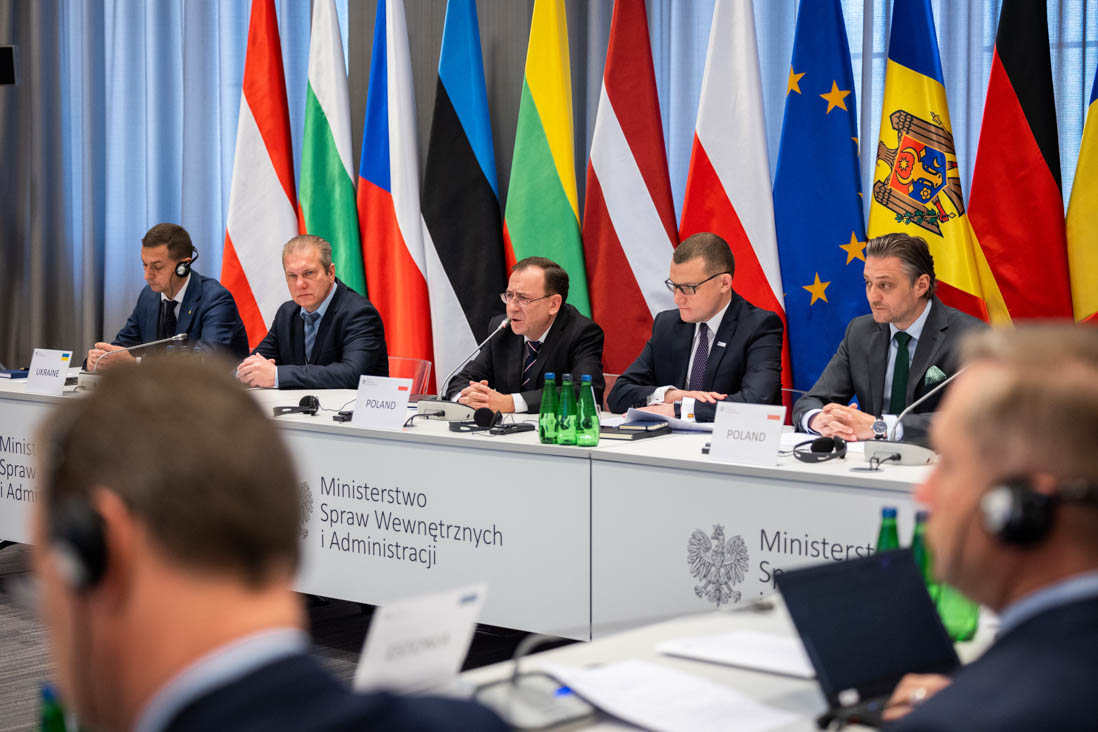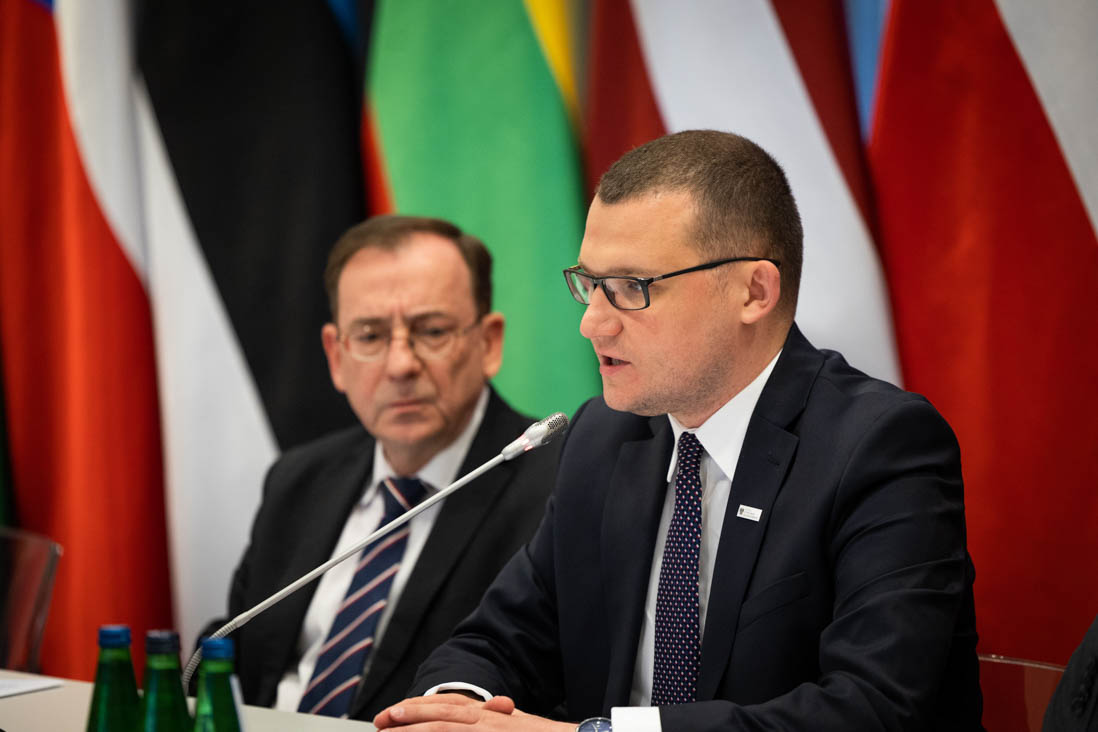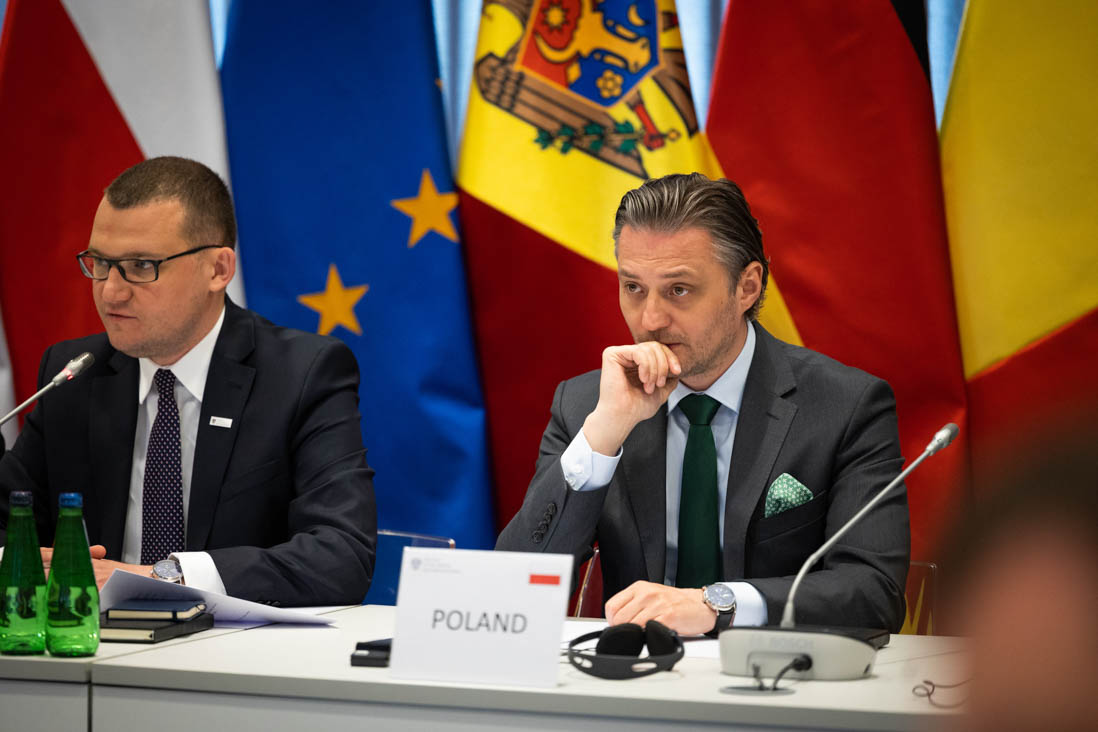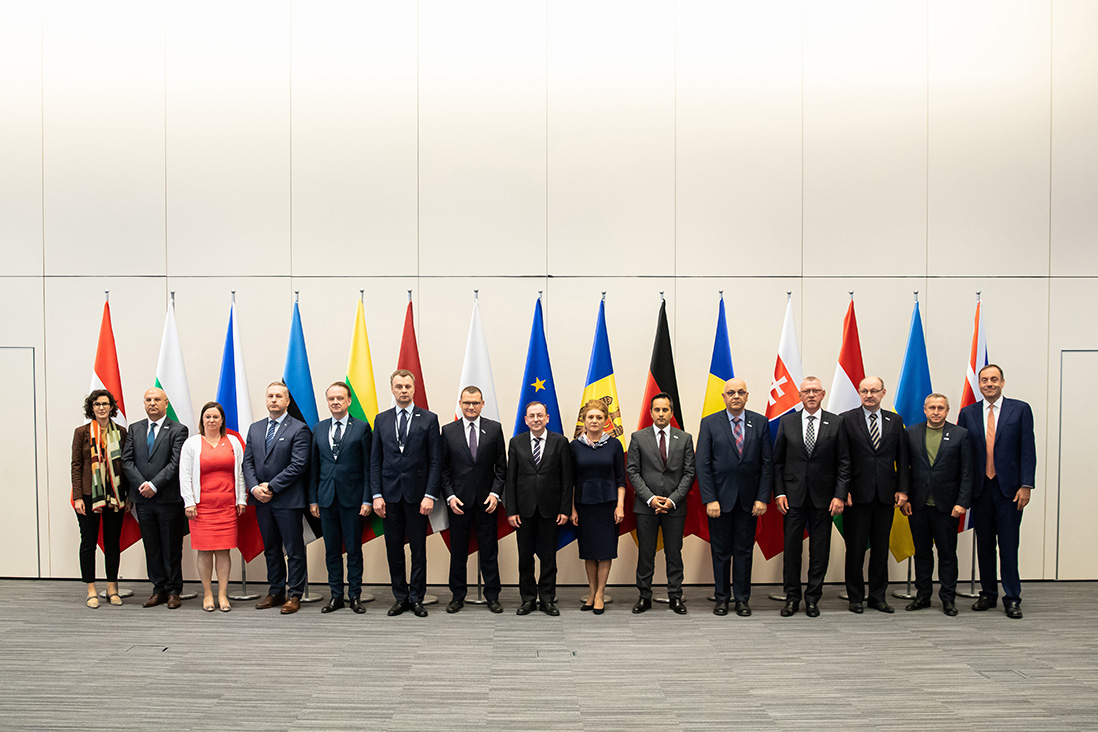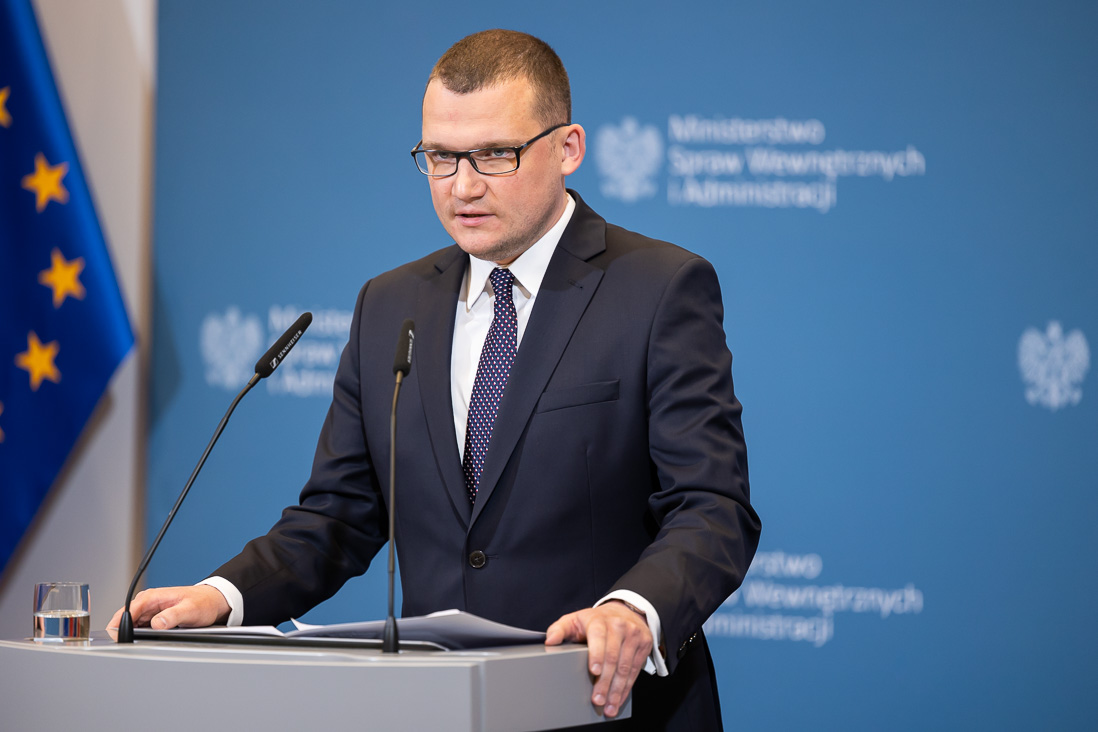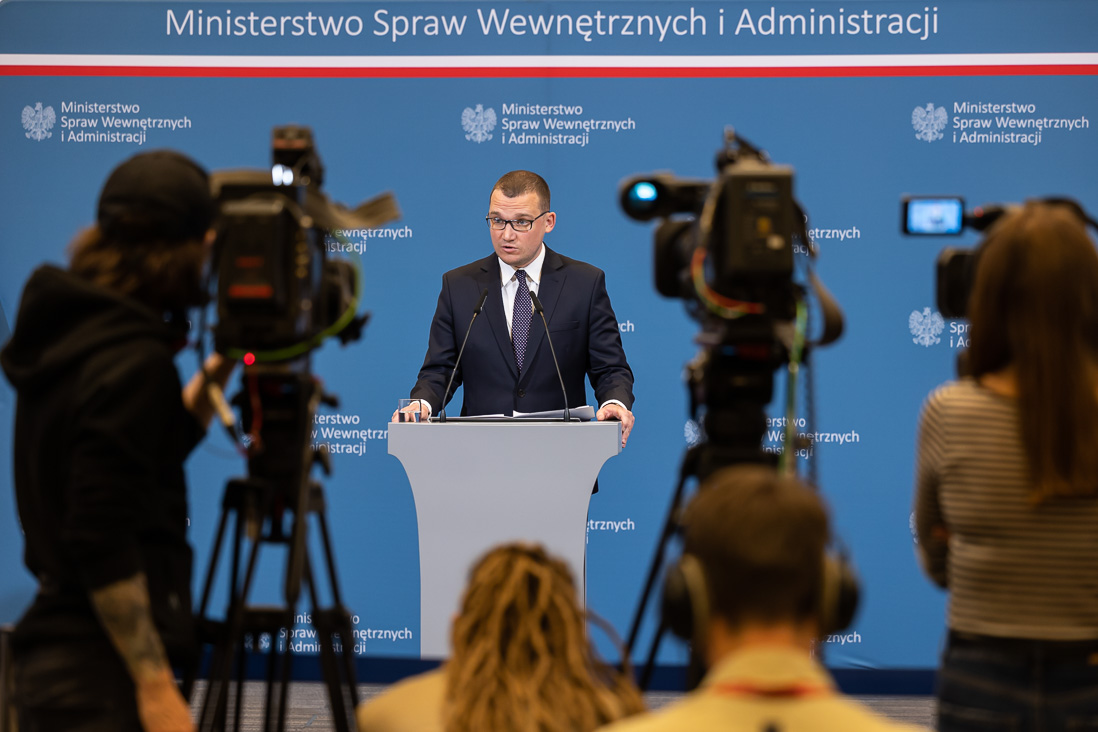International Conference of Ministers for War Refugees from Ukraine with the participation of the Head of the Ministry of the Interior and Administration
09.05.2022
On 9 May, the International Conference of Ministers for War Refugees from Ukraine was inaugurated by the Head of the Ministry of the Interior and Administration, Mariusz Kamiński. The conference was also attended by Deputy Minister Paweł Szefernaker, Government Plenipotentiary for War Refugees from Ukraine, and Deputy Minister Bartosz Grodecki.

During the meeting Minister Mariusz Kamiński referred to his last week's visit to Kiyv. On Thursday, together with the Ministers of the Interior of Lithuania, Latvia and Estonia, he met with the Head of the Ukrainian Ministry of the Interior, Denys Monastyrski.
The Ukrainian Ministry of the Interior representatives thank us all for the help we are giving to the Ukrainian refugees. Let us hope that the Ukrainian citizens are only temporarily outside their country and return to Ukraine as soon as it is safe,
said Minister Mariusz Kamiński.
Everyone stresses that these are overwhelmingly mothers with children. They must be protected. It is a matter of basic civilisation standards. We must provide women and their children with a safe haven in our country. That is the main topic of our meeting today, in addition to the exchange of experience in joint action,
the Minister added.
Minister Mariusz Kamiński emphasised that Poland provided significant support to Ukrainian services, including the fire brigade and the police.
We continue to assist the fraternal Ukrainian structures directly. We have donated 35,000 helmets, 25,000 fire suits and 20,000 fire hoses since these are very practical and necessary items,
he argued.
He also recalled that the Ukrainians still needed help with equipment. Many tasks require immediate support, such as the issue of thousands of mines left by Russian troops withdrawing from the vicinity of Kiyv and northern Ukraine. Collecting evidence of crimes is also essential.
We are gathering information and interviewing witnesses of war crimes in Ukraine. Acts of genocide must be documented now, as soon as possible. It must be strong supporting evidence before international courts,
said Minister Mariusz Kamiński.
Systemic assistance for refugees from Ukraine
During a press conference, Deputy Minister Paweł Szefernaker summarised yesterday's meeting with the participation of representatives from 12 countries. The Secretary of State at the Ministry of the Interior and Administration stated that humanitarian aid, which was provided ad hoc, was behind us.
At the moment, our countries are facing major challenges related to systemic aid. These include childcare, language courses, and refugees' relocation from large centres to smaller ones,
he said.
The Deputy Minister said that we had to be ready to make the offer of staying in smaller towns as attractive as possible for refugees.
It is also a question of organising remote learning and exams within the Ukrainian education system,
he informed.
The Government Plenipotentiary for War Refugees from Ukraine also conveyed that representatives of other governments supported Poland's actions concerning creating an additional EU fund for war refugees from Ukraine.
He recalled that in Poland, within the framework of cooperation between the government and local governments, a team has been established, developing systemic assumptions of assistance to war refugees from Ukraine. These activities primarily concern the issues of childcare, education and access to the labour market.
The Secretary of State at the Ministry of the Interior and Administration stressed that systemic solutions had been needed for years. They will be the subject of further talks, exchange of experience and information. Furthermore, he announced that the next such meeting with the participation of Ministers for War Refugees from Ukraine is planned for September.
International Conference of Ministers for War Refugees from Ukraine
Yesterday's meeting of the Ministers was attended by representatives of Poland, Lithuania, Latvia, Estonia, Romania, Bulgaria, Moldova, Slovakia, the Czech Republic, Hungary, Austria, Germany and the United Kingdom. Andrij Deszczyca, Ambassador of Ukraine to Poland, was also a guest at the conference.
Ministry representatives present at the conference stressed that the European Commission had not sufficiently responded to the financial needs related to the reception of refugees. The long and inflexible procedures of the currently operating support mechanisms (e.g. within the framework of home affairs funds) make it impossible to finance the expenditure quickly.
The participants also drew attention to the uniqueness of the current refugee crisis, which primarily affected women and children. They also agreed that given Russia's unpredictability, it was necessary to prepare for a long war and to be ready to receive further large refugee waves.
***
Міжнародна конференція міністрів до справ воєнних біженців з України за участі керівництва МВСіА
Сьогодні, 9 травня ц.р. відбулася міжнародна конференція міністрів до справ воєнних біженців з України. Конференцію відкрив очільник МВСіА Маріуш Каміньскі. У ній надто взяли участь: Павел Шефернакер, заступник міністра та уповноважений польського уряду до справ біженців, а також заступник міністра Бартош Ґродецкі.
Під час зустрічі Маріуш Каміньскі згадав про свій візит до Києва, що відбувся минулого тижня. В четвер міністр Каміньскі, а також міністри внутрішніх справ Литви, Латвії та Естонії зустрілися із очільником МВС України, Денисом Монастирським.
- Представники українського Міністерства внутрішніх справ дякують нам усім за допомогу, що ми налаємо українським біженцям. Сподіваємося, що громадяни України знаходяться поза межами своєї країни лише тимчасово, що вони повернуться в Україну тоді, коли там буде безпечно, – сказав міністр Маріуш Каміньскі. – Усі підкреслюють, що біженці – це у переважній більшості матері з дітьми. Вони повинні бути у безпеці, йдеться про основні цивілізаційні стандарти. Ми повинні гарантувати жінкам, а також їх дітям безпечний притулок у нашій країні. Це головна тема нашої нинішньої зустрічі. Ми також обмінюватимемося досвідом у царині спільних дій, – додав міністр.
Міністр Маріуш Каміньскі підкреслив, що Польща надає величезну підтримку українським службам, зокрема пожежній охороні та поліції. – Ми увесь час надаємо безпосередню допомогу братнім українським службам. Ми передали: 35 тис. шоломів, 25 тис. комбінезонів для пожежників, 20 тис. пожежних рукавів – це дуже практичні речі, що необхідні у даний момент, – казав міністр.
Він нагадав, що українцям надалі необхідна допомога з обладнанням. Багато справ вимагає надання негайної підтримки. Йдеться зокрема про усунення тисяч мін, що російські війська залишили після себе, відступаючи з околиць Києва та Північної України. Дуже важлива справа – це збирання доказів злочинів. – Ми накопичуємо інформації, допитуємо свідків воєнних злочинів, що були вчинені в Україні. Акти геноциду необхідно документувати негайно, як найшвидше. Це повинні бути переконливі докази злочинів, що розглядатимуться під час процесів у міжнародних судах, – сказав міністр Маріуш Каміньскі.
Системна допомога біженцям з України
Під час прес-конференції заступник міністра Павел Шефернакер підбив підсумки нинішньої зустрічі за участі представників 12 країн. Держсекретар МВСіА підкреслив, що надавання біженцям з України нагальної гуманітарної допомоги вже за нами. – Зараз наші держави повинні виконати завдання, що пов’язані із системною, тривалою допомогою. Йдеться зокрема про піклування про дітей, справу курсів з вивчення мови держави, на території якої перебувають біженці, а також переміщення із великих осередків (міст) до менших, – сказав Павел Шефернакер.
Заступник міністра сказав, що ми повинні бути готовими до того, що необхідно буде підготувати якомога привабливішу пропозицію перебування біженців у менших місцевостях. – Йдеться зокрема про організацію дистанційного навчання та складання іспитів у рамках української системи освіти, – повідомив Павел Шефернакер.
Уповноважений польського уряду до справ воєнних біженців з України повідомив також, що представники інших урядів підтримали дії Польщі у царині утворення додаткового фонду ЄС для підтримки воєнних біженців з України.
Він нагадав, що у Польщі – у рамках співпраці уряду із органами місцевого самоврядування – утворено робочу групу. Вона займається справами надання системної допомоги воєнним біженцям з України. Це стосується, перед усім, справи піклування про дітей, освіти та доступу на ринок праці.
Держсекретар у МВСіА підкреслив, що потрібні системні рішення, що втілюватимуться у життя впродовж декількох років. Це буде предметом нових розмов, обміну досвідом та інформаціями. Павел Шефернакер повідомив також, що наступна цього роду зустріч за участі міністрів до справ воєнних біженців запланована на вересень.
Міжнародна конференція міністрів до справ воєнних біженців з України
У нинішній зустрічі міністрів взяли участь представники: Польщі, Литви, Латвії, Естонії, Румунії, Болгарії, Молдови, Словаччини, Чехії, Угорщини, Австрії, Німеччини, а також Великобританії. Гостем конференції був Андрій Дещиця, Посол України в Польщі.
Присутні на конференції представники міністерств підкреслювали, що Європейська Комісія недостатньо добре відповіла на фінансові потреби, пов’язані із прийомом біженців. Довготривалі та не надто еластичні процедури нинішніх механізмів підтримки (до прикладу, йдеться про фонди, що повинні бути надані окремим державам у рамках Державного плану відновлення) не дають можливості швидкого фінансування витрат.
Учасники зустрічі звернули також увагу на те, що ця міграційна криза виняткова, тому що біженцями є, перед усім, жінки і діти. Усі погодилися також щодо того, що політика Росії непередбачувана, тому необхідно бути готовими до довготривалої війни та прийняття нових великих хвиль біженців.

